
Why are we sustaining what we know to be unsustainable?
Why are we sustaining what is known to be unsustainable? This question cuts to the heart of the capital-climate paradox: economic development is seen as essential to meeting the needs of a growing global population facing increasing inequality, competition for natural resources and environmental degradation. Yet development based on traditional modes of production and consumption ends up destroying the same natural and human capitals it needs to carry on growing in the future.
Little consensus on sustainable economic development

China is the classic example of this paradox. Indeed, historical experience tells us that a GDP-focused government that condones unregulated growth in the private sector results in significant negative externalities. Since opening up in 1978, China has experienced rapid economic growth. This has come with a number of notorious challenges, including high inequality, rapid urbanisation, unsustainable environmental practices and external imbalances. As part of its ‘Made in China 2025’ development initiative China champions the role of the private sector. However, Chinese policymakers are simultaneously facing rising domestic and international pressure. They must now address the negative impacts of unrestrained growth policies.
Reconsidering a more inclusive development is part of our work at New Angles. For example, the tool ‘Aiming for the Blue Box’ maps the Human Development Index against the Environmental Footprint. This simple image helps companies recognise that they can chart their course towards net positive impacts in their own value chain (equivalent to their share of the global picture) – keeping them focused on the big picture when setting operational goals and KPIs.
Sustainable development: an opportunity for business
The concept of ‘sustainable development’ emerged with the release of the ‘Our Common Future’ report in 1987. This report drew on the Club of Rome’s ‘Limits to Growth’ report of 1972. These texts established the fundamental insight that “sustainable development is development that meets the needs of the present without compromising the ability of future generations to meet their own needs.” This principle served as the basis for the Millennium Goals of 1985. And which also served as material for the Sustainable Development Goals (SDGs) in 2015. The SDGs call for worldwide action among governments, business and civil society. The goals? To end poverty and create a life of dignity and opportunity for all. (Within the carrying capacity of the planet’s natural resources, of course).
Once again, business is being called upon not to perpetuate the model of unconstrained growth. Businesses are asked to rethink development in terms of sustainability. The Business and Sustainable Development Commission emphasises the opportunity and necessity of aligning business activity with the Global Goals. It estimates that achieving the SDGs will create US$12 trillion of market opportunities. The ideal reconciliation of business interest and the general interest – and an updated model of development – could finally resolve the capital-climate paradox. The next challenge is creating the mindset change necessary to implement it, sector by sector, company by company, one manager at a time…
Using the SDG Materiality Map
How does New Angles leverage the SDGs to help organisations achieve their positive impact goals? Discover our SDG Materiality Map Springboard. We are happy to discuss this method with you and talk about your impact ambitions during a free 30-minute call. Click below to reserve a slot!
(And in the meantime, discover our tailor-made offers)
Impact Base-Camp: developing impact leaders and creating a collective
Impact Academy: training ExCo’s and managers for impact
Impact Change Lab: building a sustainable business model & prototyping solutions








No comment yet, add your voice below!